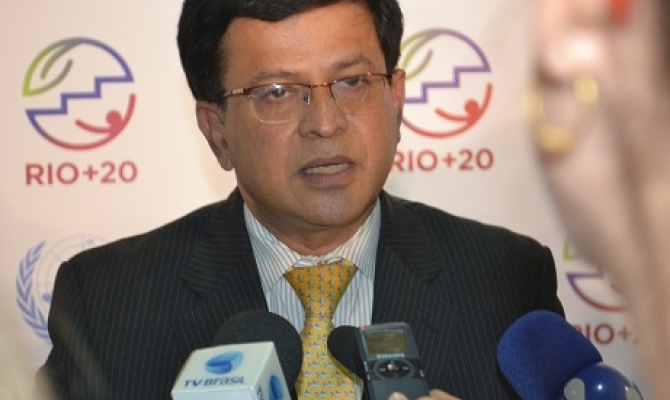
Environmental Monitoring and Governance
By Ms. Makereta Komai, Editor, PACNEWS
15 June 2012, Rio de Janeiro - Hours before negotiations concluded Friday, there was an 'air of cautious optimism' at the Rio+20 conference as negotiators from more than 190 countries battled against time to reach a consensus on an agreed text for world leaders to endorse next week.
The proposed outcome document, titled 'The Future We Want' hopes to express the commitment of all nations to practical measures to implement sustainable development.
United Nations Secretary General, Ban Ki Moon described sustainable development as 'the balance between economic growth and the needs of a growing population against the ecological necessity to conserve the planet's most precious resources – land, air and water.'
By Friday afternoon, 28 percent of the draft text had been agreed to by Parties, said Secretary General of Rio+20 Conference, Nikhil Seth.
 Secretary General of Rio+20 Conference, Nikhil Seth.
Secretary General of Rio+20 Conference, Nikhil Seth.
 Secretary General of Rio+20 Conference, Nikhil Seth.
Secretary General of Rio+20 Conference, Nikhil Seth."The statistics do not really capture the work currently done in the cluster groups as many packages are being finalised and turned into text language.
"There is agreement here that it is in all our interest – all the Parties present in Rio – to bring closure to the negotiations which has been going on for the past six months.
Seth said facilitators of the different splinter groups have gone out of their way to try and bring consensus in the different thematic areas.
"Each facilitator is using different approach to reach agreement. One of these was the group on Sustainable Development and Means of Implementation (MOI), whose facilitator allowed discussions on a new text introduced by a group within the negotiation. It was successful because it was able to advance conclusion on some critical issues", said Seth.
Brazil, who takes over the chair of the session from Friday night, will attempt to ensure the process in the next few days is transparent and inclusive as possible before a final declaration is endorsed by world leaders next Friday (22 June) here in Rio de Janeiro, two decades after they agreed to Agenda 21.
"It will be up to the Brazilian Presidency to decide on how it will take the process forward – whether it wants to continue with the current informal groups to achieve the expected goal of a declaration at the end of Rio +20 Conference."
Agenda 21 was adopted by 178 countries in 1992 at the Rio de Janeiro Earth Summit in 1992.
Fears of a repeat of climate talks in Copenhagen in 2010 was brushed aside by Seth, who insists that consensus was only achieved in the very last hours of the negotiations in Rio, in 1992.
"Here the idea is not a legally binding agreement but a declaration on global agreement on sustainable development. So I think Copenhagen may not be a good comparison, he told journalists.
At the end of the first week, the Secretariat for the Rio+20 conference reported that just over 28,700 delegates were registered for the two weeks meeting. More than 7,400 were accredited as Member State delegates while 2,663 were registered as Non-Governmental Organisations and 2,270 journalists.
More than 130 heads of state and government will be in Rio next week to push for a global action for change.
Secretary General Ban Ki Moon said success is not guaranteed.
"To secure our world for future generations — and these are indeed the stakes — we need the partnership and full engagement of global leaders, from rich nations and poor, small countries and large.
"This agenda is for national leaders to decide, in line with the aspirations of their people. If I were to offer advice as U.N. secretary general, it would be to focus on three "clusters" of outcomes that will mark Rio+20 as the watershed that it should be.
"Rio+20 should inspire new thinking — and action. Clearly, the old economic model is breaking down. In too many places, growth has stalled. Jobs are lagging. Gaps are growing between rich and poor, and we see alarming scarcities of food, fuel and the natural resources on which civilization depends.
Because so many of today's challenges are global, they demand a global response, said the UN Secretary General.
"Now is not the moment for narrow squabbling. This is a moment for world leaders and their people to unite in common purpose around a shared vision of our common future — the future we want."